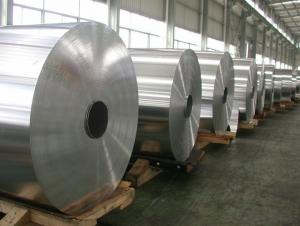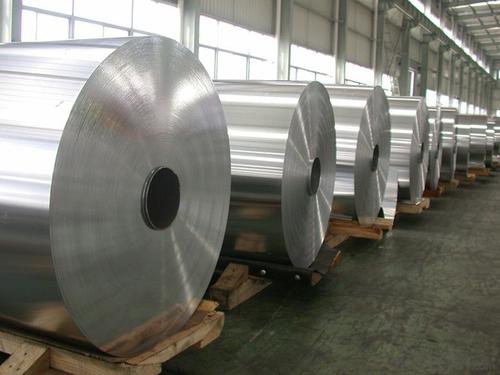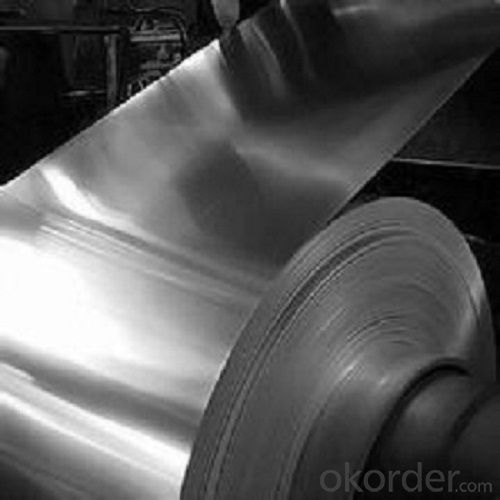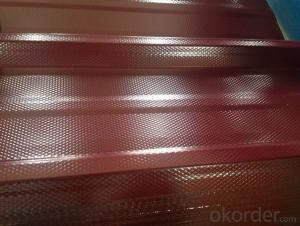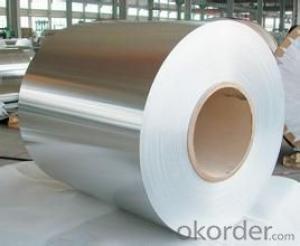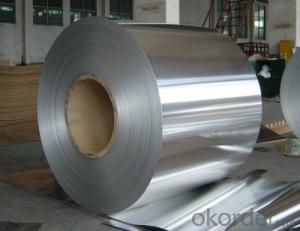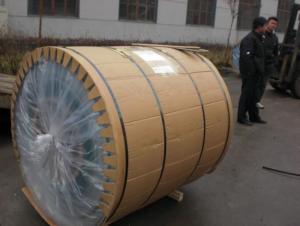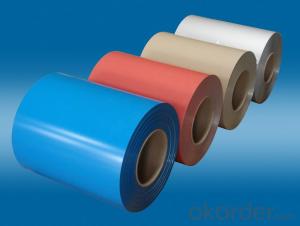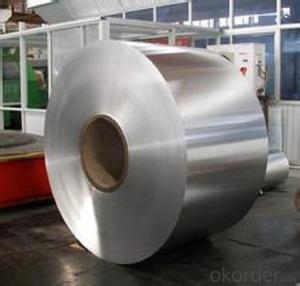Aluminum Coil Nj for Roofing and Decoration
- Loading Port:
- Shanghai
- Payment Terms:
- TT OR LC
- Min Order Qty:
- 2.5
- Supply Capability:
- 5000 m.t./month
OKorder Service Pledge
OKorder Financial Service
You Might Also Like
Specification
Aluminium Coil for Roofing and Decoration
l Specification
| 1060 aluminum Chemical composition | ||||||||
| Al | V | Cu | Mg | Zn | Mn | Ti | Fe | |
| 99.6 | 0.05 | 0.05 | 0.03 | 0.05 | 0.03 | 0.03 | 0.35 | |
| 1060 aluminum Mechanical properties | ||||||||
| Tensile strength(σb (MPa) | elongationδ10 (%) | |||||||
| 110-136 | 3%-5% | |||||||
Alloy | Temper | Thickness/mm | Width/mm | Length/mm | Application | |
1XXX | 1060 | O,H112, H14,H16,H18,H22,H24,etc | 0.2-8.0 | ≤2650 | ≤2500 | PS sheet, CTP sheet, lighting parts and etc |
l Packaging & Delivery
Packaging detail: wooden pallets that are suitable for long distance exporting
Delivery detail: 25-30 days after receiving L/C or payment in advance
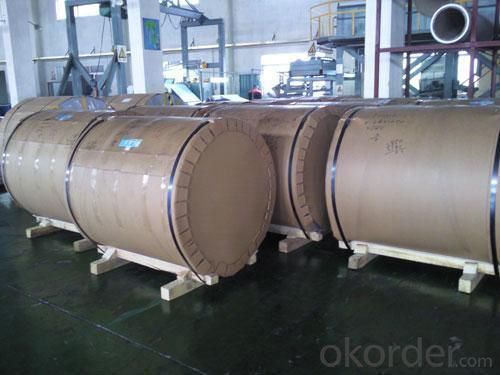
l Company Profile
CNBM International Corporation, China National Building Materials (Group) Corporation, is one of the largest companies in China building material & equipment industry, with 42,800 employees and sales in 2005 of US Dollar 4.395 billion. In 2006, China National Building Material Company Limited was listed on Hong Kong Stock Market with the stock code as 3323. Aluminium coil is a popular product in CNBM. With best quality and service, we have won reputation around the world.. |
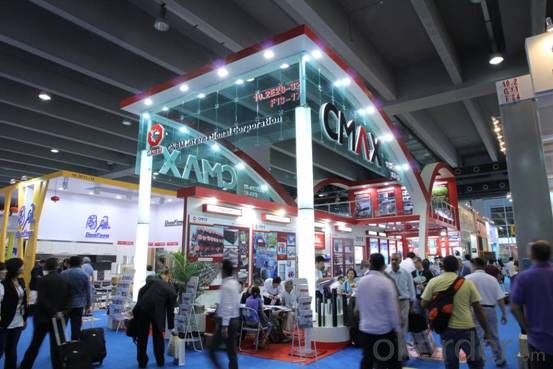
l CNBM World Wide
l Product Images
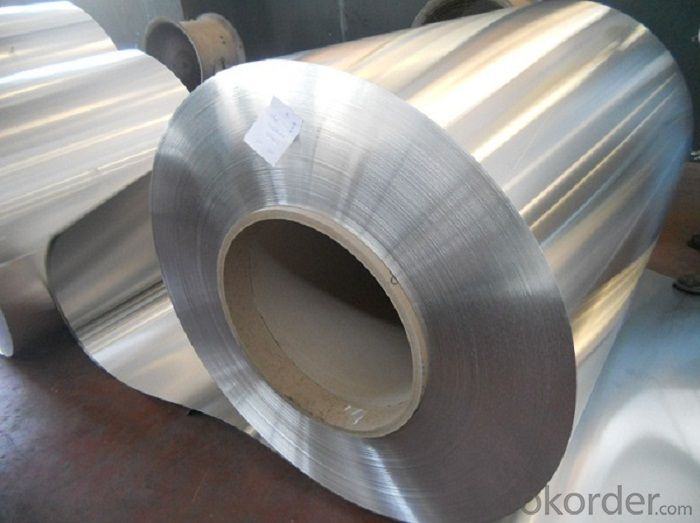
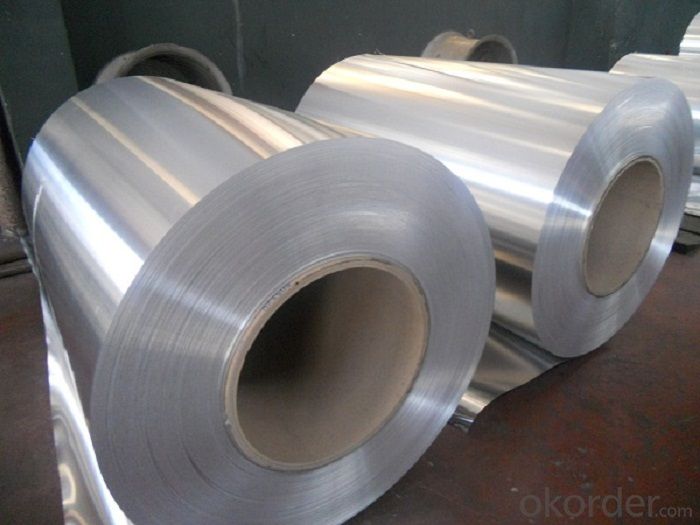
l Certificates
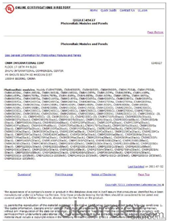
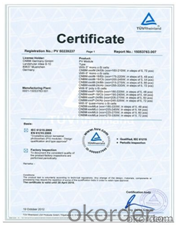
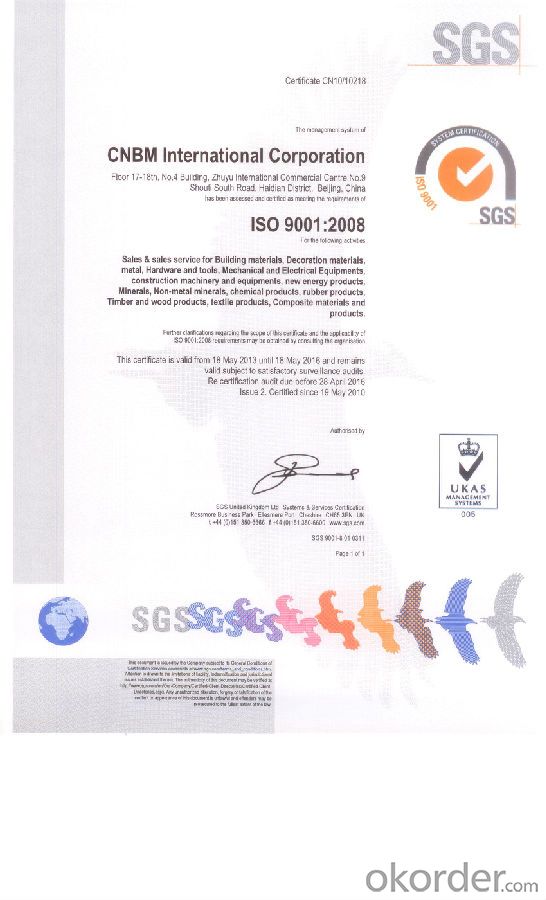
l FAQ
Q: Do you provide free samples?
A: Yes, free samples will be sent to you on freight at destination.
Q: Can I get your latest products catalogue?
A: Yes, it will be sent to you in no time
Q: What is the MOQ?
A: 2.5 tons
Q: What are your payment terms?
A: We accept L/C, T/T.
- Q: im doing this essay in my chemistry class that suppose to be a ficional story about the day my element, aluminum, slowly began disappearing.i know some things that will happen like no soda cans of anything of that, no foil no forks or spoons anything metally. i need more effects that will happen but my major problem is how to start this. i have no clue like how to begin.can anyone help pleased.!
- Mass produced things like aluminum don't just disappear in one day. They would already use alternative resource by the time it was scarce.
- Q: Can aluminum coils be used in automotive heat exchangers?
- Indeed, automotive heat exchangers can utilize aluminum coils. The automotive industry favors aluminum for heat exchangers due to its exceptional thermal conductivity, lightweight quality, and resistance against corrosion. These attributes enable aluminum coils to effectively transfer heat between fluids or gases, rendering them highly suitable for automotive heat exchangers. Furthermore, aluminum coils are easily manufacturable and can be molded into diverse shapes and sizes, thereby further enhancing their appropriateness for automotive applications.
- Q: Can aluminum coils be anodized?
- Yes, aluminum coils can be anodized. Anodizing is a process of enhancing the natural oxide layer on the surface of aluminum to create a more durable and corrosion-resistant coating.
- Q: Is it possible to utilize aluminum coils in the construction of solar panels or wind turbines?
- <p>Aluminum coils can be used in the construction of both solar panels and wind turbines, but not as the primary material for energy conversion. In solar panels, aluminum is often used for framing and mounting structures due to its lightweight and corrosion-resistant properties. For wind turbines, aluminum is utilized in the manufacturing of certain components such as nacelle shells and towers, but the main rotor blades are typically made from composite materials for their strength and aerodynamic properties. Thus, while aluminum plays a supportive role in these renewable energy technologies, it is not the core material for capturing solar or wind energy.</p>
- Q: Can aluminum coils be used for window frames?
- Yes, aluminum coils can be used for window frames. Aluminum is a popular choice for window frames due to its durability, lightweight nature, and resistance to corrosion. It is commonly used in both residential and commercial applications. Aluminum coils can be easily shaped and manipulated to fit various window sizes and styles. Furthermore, aluminum frames offer excellent thermal insulation properties, which can help improve energy efficiency in buildings. Overall, aluminum coils are a reliable and practical option for window frame construction.
- Q: Is it safe to use aluminum coils in various applications?
- <p>Yes, aluminum coils are generally safe to use. They are widely used in various industries due to their excellent thermal conductivity, corrosion resistance, and lightweight properties. Aluminum coils are non-toxic and do not emit harmful substances, making them safe for applications such as food packaging and construction. However, safety can depend on specific uses and manufacturing processes, so it's important to ensure that the coils meet the required safety standards for their intended application.</p>
- Q: Are aluminum coils suitable for heat exchanger applications?
- Yes, aluminum coils are suitable for heat exchanger applications. Aluminum is a lightweight and highly conductive material, making it an excellent choice for heat transfer applications. Aluminum coils offer several advantages in heat exchangers, such as high thermal conductivity, corrosion resistance, and ease of fabrication. They are commonly used in various heat exchanger systems, including air conditioning, refrigeration, and automotive applications. Additionally, aluminum coils can be easily formed into different shapes and sizes, allowing for greater design flexibility. Overall, aluminum coils are a reliable and efficient option for heat exchanger applications.
- Q: Can a rolling machine be utilized to transform aluminum coils into flat sheets?
- <p>Yes, you can use a rolling machine to roll aluminum coils into sheets. Rolling machines are specifically designed to apply pressure and reduce the thickness of metal coils, such as aluminum, into thinner, flatter sheets. The process involves passing the aluminum coil through the rolling mill, where it is compressed between rollers. This process can be repeated to achieve the desired thickness and flatness of the aluminum sheet. It's important to ensure the rolling machine is suitable for aluminum and that the appropriate settings are used to avoid damaging the material or the machine.</p>
- Q: So on friday we mixed crystaline copper chloride stuffs with water to make a clear blue solution. We then put some aluminum into the solution. The solution began to heat up and there was a redish brown precipitate at the end. What caused the heat? What was boiling? How does the mass of the original aluminum and original copper chloride crystaline stuff compare with the mass of the red/brown power stuff (we strained the liquid out), and the mass of the dried up blue stuff?
- RE: Copper (II) Chloride Aluminum Lab! ? on a similar time as observing the filtrate of this lab, it incredibly is the Aluminum Chloride, what surely observations must be made approximately it? additionally, as quickly as you first pour the Copper (II) Chloride crystals into the water, is it heterogeneous or homogeneous? How approximately in case you enable the beaker sit down undisturbed for some...
- Q: What is the typical conductivity of aluminum coils?
- Aluminum coils exhibit a relatively high typical conductivity, with a range of values between 34 and 38 million Siemens per meter (MS/m) at room temperature. Renowned for its exceptional electrical conductivity, aluminum finds extensive application in diverse electrical uses such as power transmission lines, electrical conductors, and coils. This notable conductivity enables the smooth and efficient flow of electric current through aluminum coils, rendering them apt for dependable and efficient electricity conduction.
Send your message to us
Aluminum Coil Nj for Roofing and Decoration
- Loading Port:
- Shanghai
- Payment Terms:
- TT OR LC
- Min Order Qty:
- 2.5
- Supply Capability:
- 5000 m.t./month
OKorder Service Pledge
OKorder Financial Service
Similar products
Hot products
Hot Searches
Related keywords
